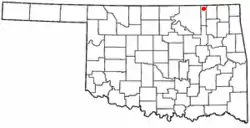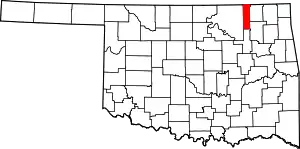Copan, Oklahoma
Copan is a town in Washington County, Oklahoma, United States. The population was 733 at the 2010 census, a decline of 7.9 percent from the figure of 796 recorded in 2000.[5]
Copan, Oklahoma | |
|---|---|
 Location of Copan, Oklahoma | |
| Coordinates: 36°54′0″N 95°55′35″W | |
| Country | United States |
| State | Oklahoma |
| County | Washington |
| Area | |
| • Total | 1.02 sq mi (2.64 km2) |
| • Land | 1.02 sq mi (2.64 km2) |
| • Water | 0.00 sq mi (0.00 km2) |
| Elevation | 768 ft (234 m) |
| Population (2010) | |
| • Total | 733 |
| • Estimate (2019)[2] | 737 |
| • Density | 721.84/sq mi (278.81/km2) |
| Time zone | UTC-6 (Central (CST)) |
| • Summer (DST) | UTC-5 (CDT) |
| ZIP code | 74022 |
| Area code(s) | 539/918 |
| FIPS code | 40-17100[3] |
| GNIS feature ID | 1091678[4] |
History
The Atchison, Topeka & Santa Fe Railway built a station at this site in 1899, which it named Copan, after the city of Copán, Honduras. However, when a post office was established here in 1900, it was designated as Lawton. The settlement was renamed Weldon in 1901, but reverted to Copan in 1904. It was incorporated under that name in Indian Territory in 1906. The Copan school district was founded in 1906, as well. By 1907, the town had 305 residents.[6]
The blossoming oil industry in Washington County spurred the growth of Copan. The Prairie Oil and Gas Company built Oklahoma's first trunk pipeline, which ran from Bartlesville, Oklahoma to Humboldt, Kansas in 1904. It also included an oil storage terminal near Copan, with 107 tanks, designed to hold 35,000 barrels of crude oil. The Copan oil field was discovered in 1907, and had nearly 2,200 producing wells by 1915.[6]
The town managed to survive and recover from major fires in 1906, 1911 and 1912. It enjoyed a spurt of growth after the creation of nearby Lake Hulah in 1951, and Lake Copan in 1983. Population reached a high of 960 in 1980, largely because the lakes increased tourism. The town economy is now largely based on travel and recreation.[6]
Transportation History
Prior to the construction of Copan Dam west of town, US-75 and OK-10 came through downtown Copan. US-75 entered Washington County from High Street in nearby Caney Kansas. As the old Highway 75 came south, it entered the town on Caney Street. As it exited south of town, it rejoined the current alignment at Washington County Road N 3975 Rd. OK-10 came out of the town of Wann Oklahoma in northern Nowata County Oklahoma, entered the town at Golden Avenue, then came south on Caney Street (old U-75) for 0.3 miles, then continued west on Weldon Avenue. There were two 90 degree curves on the town's west side, the first took the highway south for 0.1 miles, the second took the highway back toward the west and had it concurrency with Washington County W. 850 Rd and intersected Washington County N. 3970 Rd, and crossed the Little Caney River, and rejoined the current alignment of OK-10 west of the now Copan Lake into Osage County Oklahoma.
The current alignment on US-75 comes off of McGee Street in Caney Kansas, continues south along the east side of Copan Lake, then continues east of Copan. The current alignment of OK-10 in Copan that it has its concurrency with US-75 east of town beginning at Golden Avenue, then continues south for 1.1 miles, then turns to the west, and continues over Copan Dam. It continues north, then west into Osage County Oklahoma.
The Burlington Northern and Atchison Topeka & Santa Fe Merger
Prior to the merger between the Burlington Northern and the Atchison Topeka & Santa Fe in 1995, the line between nearby Caney Kansas into Tulsa Oklahoma was the main north-south rail line through Washington County Oklahoma. The line came out of Caney Kansas on the town's west side, then continued south into the town of Copan. It ran roughly parallel with Caney Street, and continued on the west side of downtown Copan, then exited the town to the south. Towns and cities in Washington County Oklahoma that were served by the line were, Owen Township, Copan, Dewey, Bartlesville, Ochelata, Ramona, and Vera. It continued south into Tulsa County Oklahoma through Collinsville, Owasso, into Tulsa. The existing switch is located west of Greenwood Avenue where it merges with the current BNSF Cherokee Subdivision through downtown Tulsa. There were as many as eight trains a day that ran this line. It was fully signaled.
The line was to be abandoned by the newly formed Burlington Northern & Santa Fe (BNSF). This would have left Washington County Oklahoma including Copan without rail service. This line also served the Montgomery Kansas towns of Caney, Havana, Wayside, Bolton, Independence, and Cherryvale. WATCO purchased the line from BNSF post merger, and BNSF still has trackage rights. The line is now Southern Kansas & Oklahoma Line (SKOL) now headquartered in Cherryvale Kansas. .As a consequence of the merger, BNSF continued to maintain the Afton Subdivision that comes off the Cherokee Subdivision in Afton Oklahoma, and the Fort Scott Subdivision from Springfield Missouri. There is no Class 1 rail service in Washington County Oklahoma and Copan.
Geography
Copan is located at 36°54′0″N 95°55′35″W (36.899926, -95.926447).[7] It is 14 miles (23 km) north of Bartlesville on U.S. Highway 75.[6]
According to the United States Census Bureau, the town has a total area of 1.0 square mile (2.6 km2), all land.
Demographics
| Historical population | |||
|---|---|---|---|
| Census | Pop. | %± | |
| 1910 | 307 | — | |
| 1920 | 430 | 40.1% | |
| 1930 | 521 | 21.2% | |
| 1940 | 549 | 5.4% | |
| 1950 | 459 | −16.4% | |
| 1960 | 617 | 34.4% | |
| 1970 | 675 | 9.4% | |
| 1980 | 960 | 42.2% | |
| 1990 | 809 | −15.7% | |
| 2000 | 796 | −1.6% | |
| 2010 | 733 | −7.9% | |
| 2019 (est.) | 737 | [2] | 0.5% |
| U.S. Decennial Census[8] | |||
As of the census[3] of 2000, there were 796 people, 346 households, and 232 families residing in the town. The population density was 777.7 people per square mile (301.3/km2). There were 386 housing units at an average density of 377.1 per square mile (146.1/km2). The racial makeup of the town was 81.53% White, 13.07% Native American, 0.38% Asian, 0.63% from other races, and 4.40% from two or more races. Hispanic or Latino of any race were 1.76% of the population.
There were 346 households, out of which 28.0% had children under the age of 18 living with them, 54.9% were married couples living together, 9.5% had a female householder with no husband present, and 32.7% were non-families. 30.9% of all households were made up of individuals, and 13.3% had someone living alone who was 65 years of age or older. The average household size was 2.30 and the average family size was 2.88.
In the town, the population was spread out, with 24.9% under the age of 18, 6.0% from 18 to 24, 24.4% from 25 to 44, 27.0% from 45 to 64, and 17.7% who were 65 years of age or older. The median age was 41 years. For every 100 females, there were 93.2 males. For every 100 females age 18 and over, there were 85.1 males.
The median income for a household in the town was $27,222, and the median income for a family was $36,563. Males had a median income of $30,938 versus $20,119 for females. The per capita income for the town was $16,324. About 6.8% of families and 12.1% of the population were below the poverty line, including 14.4% of those under age 18 and 10.4% of those age 65 or over.
Places of Interest
- Copan Lake
- Hulah Lake, located 14 miles west of Copan on OK-10
- Washington Cove, a public beach on Washington County W. 850 Rd
- Wah-Sha-She State Park, located on OK-10 on the east end of Copan Dam
- Post Oak Recreation Area, located on the west shores of Copan Lake west of the dam on OK-10
- Washington Cove Campground, located wast of Copan on Washington County N. 3970 Rd
- Copan Rodeo Arena, located on Golden Avenue, west of US-75
- Copan Park, located on N. Caney and E. Lawton Avenue next to the City Hall and Fire Department
- Copan Wildlife Management Area
References
- "2019 U.S. Gazetteer Files". United States Census Bureau. Retrieved July 28, 2020.
- "Population and Housing Unit Estimates". United States Census Bureau. May 24, 2020. Retrieved May 27, 2020.
- "U.S. Census website". United States Census Bureau. Retrieved 2008-01-31.
- "US Board on Geographic Names". United States Geological Survey. 2007-10-25. Retrieved 2008-01-31.
- CensusViewer:Population of the City of Copan, Oklahoma
- May, Jon D. Encyclopedia of Oklahoma History and Culture. "Copan." Accessed April 26, 2012.
- "US Gazetteer files: 2010, 2000, and 1990". United States Census Bureau. 2011-02-12. Retrieved 2011-04-23.
- "Census of Population and Housing". Census.gov. Retrieved June 4, 2015.
